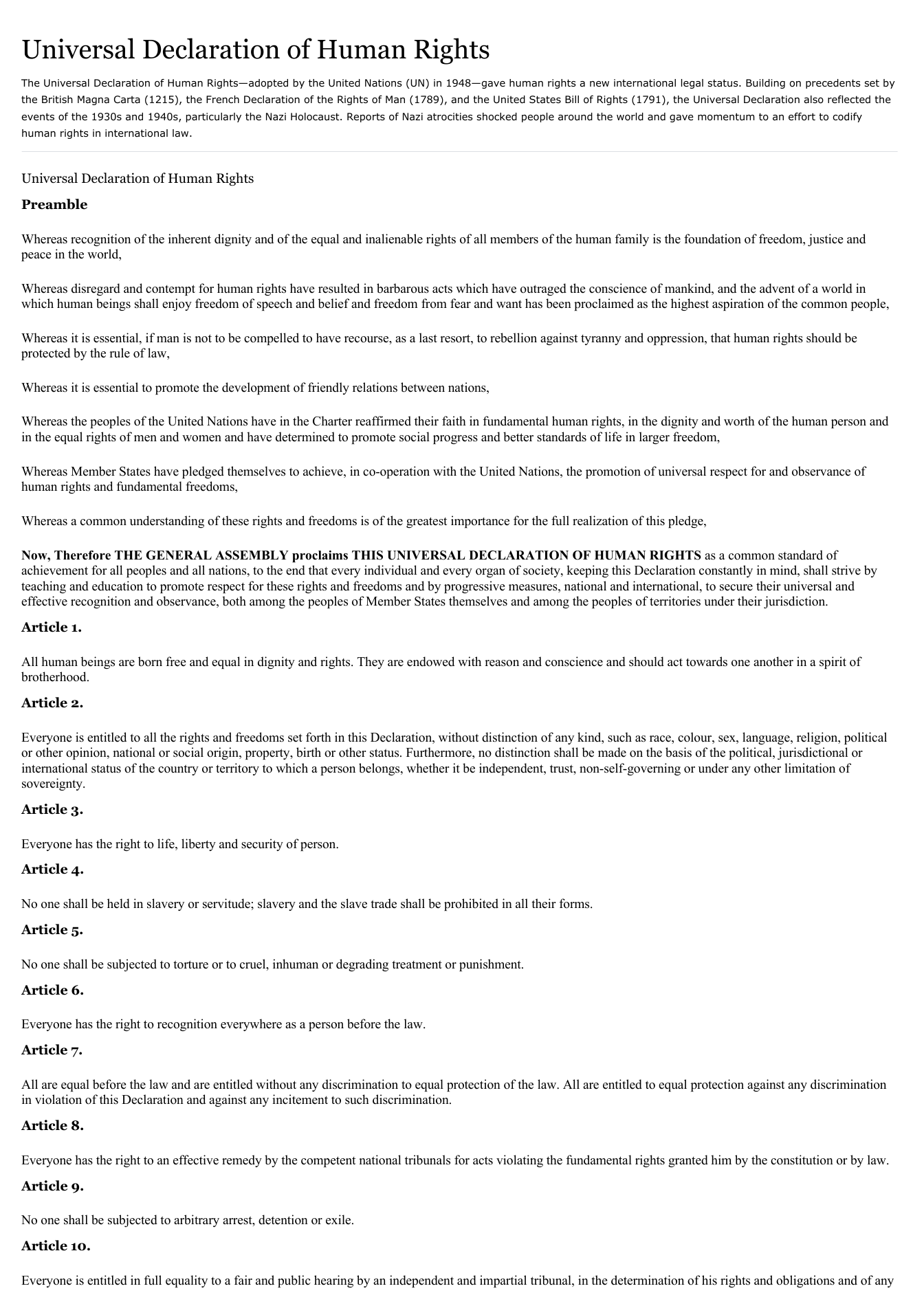Universal Declaration of Human RightsThe Universal Declaration of Human Rights--adopted by the United Nations (UN) in 1948--gave human rights a new international legal status.
Publié le 18/05/2020

Extrait du document
«
Universal Declaration of Human Rights
The Universal Declaration of Human Rights—adopted by the United Nations (UN) in 1948—gave human rights a new international legal status.
Building on precedents set bythe British Magna Carta (1215), the French Declaration of the Rights of Man (1789), and the United States Bill of Rights (1791), the Universal Declaration also reflected theevents of the 1930s and 1940s, particularly the Nazi Holocaust.
Reports of Nazi atrocities shocked people around the world and gave momentum to an effort to codifyhuman rights in international law.
Universal Declaration of Human Rights
Preamble
Whereas recognition of the inherent dignity and of the equal and inalienable rights of all members of the human family is the foundation of freedom, justice andpeace in the world,
Whereas disregard and contempt for human rights have resulted in barbarous acts which have outraged the conscience of mankind, and the advent of a world inwhich human beings shall enjoy freedom of speech and belief and freedom from fear and want has been proclaimed as the highest aspiration of the common people,
Whereas it is essential, if man is not to be compelled to have recourse, as a last resort, to rebellion against tyranny and oppression, that human rights should beprotected by the rule of law,
Whereas it is essential to promote the development of friendly relations between nations,
Whereas the peoples of the United Nations have in the Charter reaffirmed their faith in fundamental human rights, in the dignity and worth of the human person andin the equal rights of men and women and have determined to promote social progress and better standards of life in larger freedom,
Whereas Member States have pledged themselves to achieve, in co-operation with the United Nations, the promotion of universal respect for and observance ofhuman rights and fundamental freedoms,
Whereas a common understanding of these rights and freedoms is of the greatest importance for the full realization of this pledge,
Now, Therefore THE GENERAL ASSEMBLY proclaims THIS UNIVERSAL DECLARATION OF HUMAN RIGHTS as a common standard of achievement for all peoples and all nations, to the end that every individual and every organ of society, keeping this Declaration constantly in mind, shall strive byteaching and education to promote respect for these rights and freedoms and by progressive measures, national and international, to secure their universal andeffective recognition and observance, both among the peoples of Member States themselves and among the peoples of territories under their jurisdiction.
Article 1.
All human beings are born free and equal in dignity and rights.
They are endowed with reason and conscience and should act towards one another in a spirit ofbrotherhood.
Article 2.
Everyone is entitled to all the rights and freedoms set forth in this Declaration, without distinction of any kind, such as race, colour, sex, language, religion, politicalor other opinion, national or social origin, property, birth or other status.
Furthermore, no distinction shall be made on the basis of the political, jurisdictional orinternational status of the country or territory to which a person belongs, whether it be independent, trust, non-self-governing or under any other limitation ofsovereignty.
Article 3.
Everyone has the right to life, liberty and security of person.
Article 4.
No one shall be held in slavery or servitude; slavery and the slave trade shall be prohibited in all their forms.
Article 5.
No one shall be subjected to torture or to cruel, inhuman or degrading treatment or punishment.
Article 6.
Everyone has the right to recognition everywhere as a person before the law.
Article 7.
All are equal before the law and are entitled without any discrimination to equal protection of the law.
All are entitled to equal protection against any discriminationin violation of this Declaration and against any incitement to such discrimination.
Article 8.
Everyone has the right to an effective remedy by the competent national tribunals for acts violating the fundamental rights granted him by the constitution or by law.
Article 9.
No one shall be subjected to arbitrary arrest, detention or exile.
Article 10.
Everyone is entitled in full equality to a fair and public hearing by an independent and impartial tribunal, in the determination of his rights and obligations and of any.
»
↓↓↓ APERÇU DU DOCUMENT ↓↓↓
Liens utiles
- Declaration by United NationsSoon after the bombing of Pearl Harbor on December 7, 1941, British prime minister Winston Churchill met with United States president Franklin D.
- The Rights of Man DeclarationWith this declaration, the French National Assembly addressed many of the French people's grievances with the monarchy and established the ideals of the FrenchRevolution.
- The danger of space exploration on the human body and the environment
- essay anglais: In my opinion, the improvement of human capacities poses several problems
- Geography of the United States


